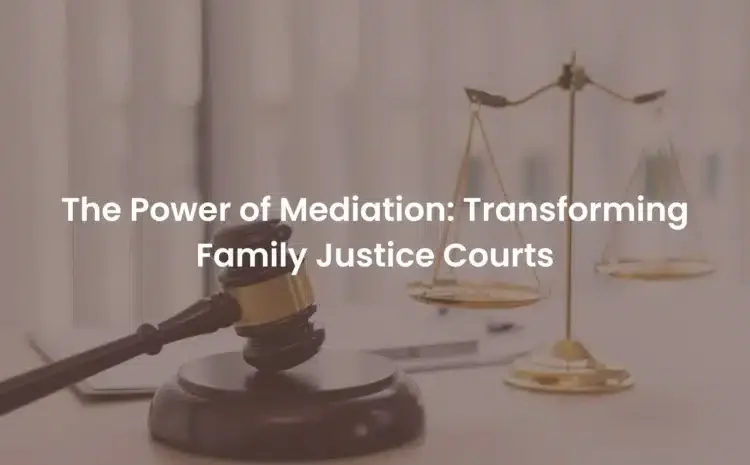The Power of Mediation: Transforming Family Justice Courts
In the realm of family law, disputes and conflicts are unfortunately common occurrences. Divorces, child custody battles, and disagreements over financial matters can create a tense and adversarial environment. However, amidst the turmoil, there exists a powerful and transformative process known as mediation. The Family Justice Courts have recognized the immense benefits of mediation, revolutionizing the way family disputes are resolved. In this blog post, we will delve into the numerous advantages of mediation at the Family Justice Courts and how it fosters a more compassionate, cooperative, and sustainable approach to resolving family conflicts.
1. Preserving Relationships
One of the most significant advantages of mediation at the Family Justice Courts is its focus on preserving relationships. Unlike traditional litigation, where parties may become entrenched in a win-lose mindset, mediation encourages open communication and collaboration. Mediators provide a safe and neutral space for families to express their concerns, feelings, and desires. By enabling constructive dialogue, mediation helps to rebuild broken lines of communication and facilitates the development of mutually beneficial solutions. By preserving relationships, mediation supports healthier co-parenting dynamics and minimizes the emotional toll on all parties involved.
2. Empowering Families
Mediation empowers families by giving them a voice in the resolution process. Instead of being subject to court-imposed decisions, families actively participate in crafting their own solutions. Mediators guide and facilitate discussions, ensuring that both parties have an opportunity to be heard. This empowerment enhances a sense of ownership over the outcome, leading to greater compliance with agreements reached during mediation. By empowering families to shape their own futures, mediation promotes long-term stability and reduces the likelihood of returning to court.
3. Cost-Effective and Efficient
Compared to traditional litigation, mediation is a cost-effective and efficient approach to resolving family disputes. Litigation can be a lengthy and expensive process, involving multiple court appearances, attorney fees, and extensive documentation. In contrast, mediation streamlines the resolution process by reducing the need for lengthy court proceedings. Parties can save significant amounts of time and money by working with a mediator who helps them focus on finding mutually agreeable solutions. Moreover, the collaborative nature of mediation often results in faster resolutions, allowing families to move forward and rebuild their lives with minimal delay.
4. Confidentiality and Privacy
Confidentiality is a cornerstone of the mediation process in the Family Justice Courts. Unlike court proceedings, which are a matter of public record, mediation offers a private and confidential setting. This confidentiality encourages parties to speak openly and honestly without fear of their words being used against them. By ensuring privacy, mediation fosters an atmosphere of trust, allowing families to explore creative solutions and engage in honest conversations. This confidentiality also shields children from unnecessary exposure to the details of their parents’ conflicts, protecting their emotional well-being.
5. Child-Centric Approach
When disputes involve children, mediation shines as a child-centric approach to resolving conflicts. Mediators at the Family Justice Courts prioritize the best interests of the child, ensuring their voices are heard and their needs are considered. By involving children in age-appropriate ways, such as through child-inclusive mediation, families can craft solutions that promote the well-being and stability of their children. Mediation facilitates the development of parenting plans that address specific concerns, schedules, and support arrangements, ultimately fostering positive co-parenting relationships and minimizing the negative impact of parental disputes on children.
Conclusion
Mediation at the Family Justice Courts provides families with a powerful alternative to traditional litigation, transforming the landscape of family law. By preserving relationships, empowering families, offering cost-effectiveness, ensuring confidentiality, and adopting a child-centric approach, mediation revolutionizes how family disputes are resolved. The Family Justice Courts’ commitment to mediation signifies a shift towards a more compassionate, cooperative, and sustainable approach. Come speak to our lawyers at 8780-2499 on how mediation will benefit your divorce.

